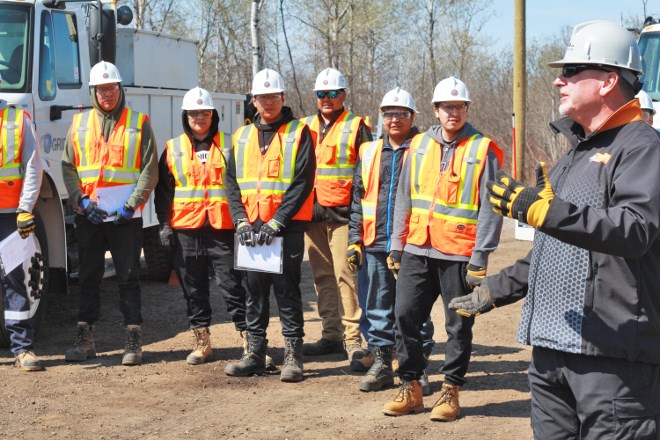A training program launched in Thunder Bay through a unique partnership aims to train line crew in preparation for the $1.6-billion construction of the Wataynikaneyap (Watay) Power Transmission Line, which will connect 17 First Nations to the hydro grid from Pickle Lake and Red Lake in northwestern Ontario.
The project provides an opportunity for Indigenous workers to benefit during the construction as well.
Nishnawbe Aski Nation Grand Chief Alvin Fiddler described how this project is different from one in Poplar Hill First Nation three years ago during the construction of its school.
“I remember walking along the road there and looking at the youth in that community. They were just watching the construction company that flies in from Winnipeg or Thunder Bay or wherever, and they set up camp and they build health centres and schools, and our people don’t benefit at all,” Fiddler said.
“That’s something that we want to address moving forward. There is the potential to create over 700 jobs, and we want our members to maximize that opportunity. This initiative will allow them to do that,” he said.
The training program partners several companies and organizations including Wataynikaneyap Power, Opiikapawiin Services, Infrastructure Health & Safety Association (IHSA), PowerTel, Oshki-Pimache-O-Win Wenjack Education Institution, and Gridlink, the utility infrastructure contractor in Thunder Bay that is hosting the training.
Wataynikaneyap Power is the power company formed by 22 First Nations, which owns 51 per cent of the company, and their operating partner Fortis Ontario, a subsidiary of Fortis Inc., which owns 49 per cent.
The Line Crew Ground Support Training Course is a 15-week certificate program, which combines classroom and practical training including several safety courses, ladder and safe pole handling, the fundamentals of working at heights, mobile crane operator training, and pole line construction.
Gridlink, a Thunder Bay utility contractor, hosted an event on May 17 for media and others to showcase the training program nearing the end of the first intake of students.
“The first class started on April 9, 2018, where 12 students were enrolled,” said Margaret Kenequanash, CEO of Wataynikaneyap Power. “Ten will be receiving certification during their last shift the week of May 25.”
She said that this is the first of four planned intakes. The next will take place in August, and two others will run next year.
Kenequanash said that the power project itself is important for those 17 First Nations that will be connected to the provincial power grid.
Diesel generators are becoming more and more unsustainable as fuel prices rise, parts become scarcer, and climate change affects winter roads, which means more diesel fuel has to be flown in – a much more expensive proposition.
According to Fortis Ontario, $43 million is spent yearly on diesel generators to support just 16 communities.
“It’s now time for our communities to enjoy what everybody has enjoyed over the years,” Kenequanash said.
She added that bringing power to these communities will improve the economic outlook for the people who live there, both during construction and after the project is complete.
“There is the overall vision of our people having meaningful involvement... and enabling them to grasp those economic opportunities that they want to pursue.”
Minister of Employment, Workforce Development and Labour Patty Hajdu attended the event representing the federal government and her riding of Thunder Bay – Superior North. She echoed Kenequanash’s comments about creating new economic opportunities.
“My role is to make sure that people have the opportunity to maximize their potential regardless of where they live, regardless of what their background is, regardless of what their birth location is – everybody should have that fair shot at success. It’s not just good for them and their families, we rely on it in Canada,” Hajdu said.
She announced that Opiikapawiin Services will receive over $2 million from the Skills and Partnership Fund to train 300 people from 26 First Nations in northwestern Ontario and help them “overcome those barriers that they have to employment.”
“It will be Indigenous-led, of course, because that’s what makes sense,” Hajdu said. “Indigenous communities know how to ensure that their folks have the skills they need to succeed.”
According to figures supplied by Wataynikaneyap Power, the project is estimated to create 769 jobs during construction and generate nearly $900 million in socio-economic value.
Further, the company reported that connecting to the provincial grid will help avoid an estimated 6.6 million tonnes of CO2 equivalent greenhouse gas emissions.
Phase 1 of the Wataynikaneyap Power Transmission Line Project is scheduled to start in early 2019, which consists of upgrading equipment and lines to Pickle Lake.
Phase 2 – connecting the 17 First Nations from the grid’s current northern terminus points in Pickle Lake and Red Lake – will start in 2019 with a projected completion date in 2023.




